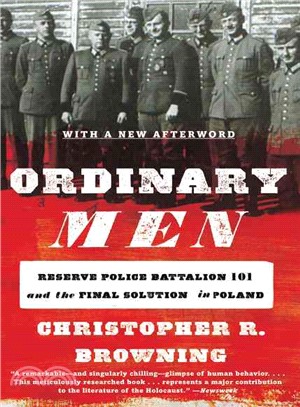目前查詢
歷史查詢

Ordinary men :Reserve Police Battalion 101 and the final solution in Poland /
- 館藏(1)
- 書目資訊
- 心得(0)
- 機讀格式
- 標籤
書名 : Ordinary men :Reserve Police Battalion 101 and the final solution in Poland /
紀錄類型 : 書目-語言資料,印刷品: 單行本
正題名[資料類型標示]/作者 : Ordinary men :Christopher R. Browning ; [with a new afterword].
其他題名 : Reserve Police Battalion 101 and the final solution in Poland /
作者 : Browning, Christopher R.,
團體作者 : Mazal Holocaust Collection.
版本項 : Revised edition.
出版者 : New York :Harper Perennial,2017.
面頁冊數 : xxii, 349 p. :ill., maps ;21 cm.
內容註 : One morning in Józefów -- The order police -- The order police and the Final solution : Russia 1941 -- The order police and the Final solution : deportation -- Reserve Police Battalion 101 -- Arrival in Poland -- Initiation to mass muder : the Józefów massacre -- Reflections on a massacre -- Lomazy : the descent of Second Company -- The August deportations to Treblinka -- Late-September shootings -- The deportations resume -- The strange health of Captain Hoffmann-- The "Jew hunt" -- The last massacres : "Harvest festival" -- Aftermath -- Germans, Poles, and Jews -- Ordinary men.
標題 : Holocaust, Jewish (1939-1945)
ISBN : 9780062303028 (pbk.) :
LEADER 03129pam a2200205 a 4500
001 940446
005 20190426092822.0
008 190514s2017 nyua g b 001 0deng d
010 $a 2017446215
020 $a9780062303028 (pbk.) :$cNT$595
040 $aTWTNM$beng$dTWTNM
050 00$aD804.3$b.B77 2017
060 4$a000084154
082 04$a940.5318$222
100 1 $aBrowning, Christopher R.,$eauthor.
245 10$aOrdinary men :$bReserve Police Battalion 101 and the final solution in Poland /$cChristopher R. Browning ; [with a new afterword].
250 $aRevised edition.
260 $aNew York :$bHarper Perennial,$c2017.
300 $axxii, 349 p. :$bill., maps ;$c21 cm.
504 $aIncludes bibliographical references and index.
505 0 $aOne morning in Józefów -- The order police -- The order police and the Final solution : Russia 1941 -- The order police and the Final solution : deportation -- Reserve Police Battalion 101 -- Arrival in Poland -- Initiation to mass muder : the Józefów massacre -- Reflections on a massacre -- Lomazy : the descent of Second Company -- The August deportations to Treblinka -- Late-September shootings -- The deportations resume -- The strange health of Captain Hoffmann-- The "Jew hunt" -- The last massacres : "Harvest festival" -- Aftermath -- Germans, Poles, and Jews -- Ordinary men.
520 $aIn the early hours of July 13, 1942, the men of Reserve Police Battalion 101, a unit of the German Order Police, entered the Polish Village of Jozefow. They had arrived in Poland less than three weeks before, most of them recently drafted family men too old for combat service--workers, artisans, salesmen, and clerks. By nightfall, they had rounded up Jozefow's 1,800 Jews, selected several hundred men as "work Jews," and shot the rest--that is, some 1,500 women, children, and old people. Most of these overage, rear-echelon reserve policemen had grown to maturity in the port city of Hamburg in pre-Hitler Germany and were neither committed Nazis nor racial fanatics. Nevertheless, in the sixteen months fromthe Jozefow massacre to the brutal Erntefest ("harvest festival") slaughter of November 1943, these average men participated in the direct shooting deaths of at least 38,000 Jews and the deportation to Treblinka's gas chambers of 45,000 more--a total body count of 83,000 for a unit of less than 500 men. Drawing on postwar interrogations of 210 former members of the battalion, Christopher Browning lets them speak for themselves about their contribution to the Final Solution--what they did, what they thought, how they rationalized their behavior (one man would shoot only infants and children, to "release" them from their misery). In a sobering conclusion, Browning suggests that these good Germans were acting less out of deference to authority or fear of punishment than from motives as insidious as they are common: careerism and peer pressure. With its unflinching reconstruction of the battalion's murderous record and its painstaking attention to the social background and actions of individual men, this unique account offers some of the most powerful and disturbing evidence to date of the ordinary human capacity for extraordinary inhumanity.
650 0$aHolocaust, Jewish (1939-1945)$vPoland.
650 0$aWorld War, 1939-1945$vPersonal narratives, German.
650 0$aWar criminals$zGermany.
650 0$aWorld War, 1939-1945$xAtrocities.
710 2 $aMazal Holocaust Collection.
